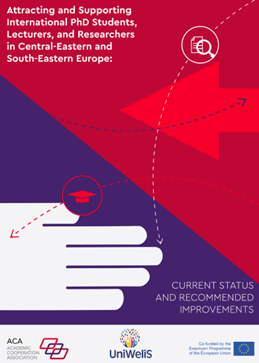Stay in the loop! Subscribe to our mailing list
 In the context of the global competition for talent and limited resources, attracting and supporting highly-skilled international academics can be difficult for many higher education institutions. Universities in the Central-Eastern and South-Eastern Europe are no exception to this challenge. While many of them have managed to attract increasingly more international students over the recent years, hosting international scholars, particularly on a longer-term basis, remains an issue in the region.
In the context of the global competition for talent and limited resources, attracting and supporting highly-skilled international academics can be difficult for many higher education institutions. Universities in the Central-Eastern and South-Eastern Europe are no exception to this challenge. While many of them have managed to attract increasingly more international students over the recent years, hosting international scholars, particularly on a longer-term basis, remains an issue in the region.
The UniWeliS partners – ACA, SAIA, n. o. (Slovak Academic Information Agency), Comenius University Bratislava, Sofia University, University of Niš, Polish National Agency for Academic Exchange (NAWA) – have published a comprehensive study looking at this topic earlier this month.
The report explores the current state of support provided to international PhD students, researchers, and lecturers at different career stages in Central-Eastern and South-Eastern Europe. It provides some novel insights into the state of play in this region, based on extensive evidence collected from 640 international academics with more than three-month mobility experience in the region and 35 host institutions.
Some of the key findings point that although the national and institutional efforts to attract and serve international academics remain rather scattered and lack strategic focus in most of the target countries, the region is still quite attractive for the surveyed academics, particularly those originating from Asia and Europe, in terms of perceived opportunities for professional and academic development, as well as a broader sociocultural context. The academics’ level of satisfaction with their mobility experience in the region is equally high: nearly two-thirds of the respondents reported that the target countries and their institutions offered a quality mobility experience (68% and 66%, respectively).
However, the noticeable share of ‘undecided’ respondents (20% for the target country and 18% for the host institution) indicated some room for improvement in the broader framework conditions and in the quality of support provided at various mobility stages, and by different actors.
The region’s institutions need to expand their support efforts beyond essential matters, such as visa and immigration, accommodation, and health insurance, and pay greater attention to social and professional integration, including family matters, while further professionalising and optimising internal support processes and systems. This task requires a combination of actions, including stronger collaboration between different institutional actors and with external partners, as well as institutional capacity-building and staff training that could be further enabled by national funders and policymakers.
The study offers a set of specific recommendations to national funders, policymakers, and higher education institutions on how to further improve the attraction and support of global talent in this region, which can also be insightful for higher education players in other parts of Europe and beyond.
Check the full report here